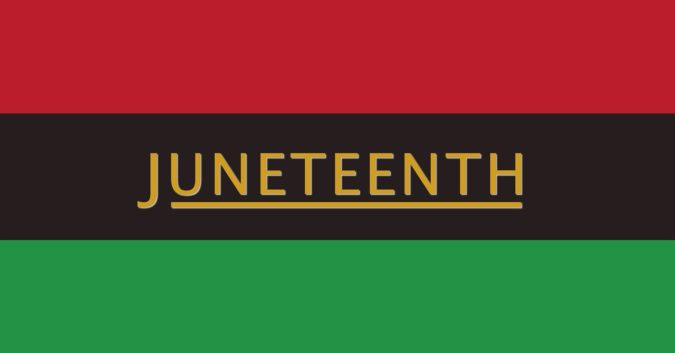Abraham Lincoln issued the Emancipation Proclamation on January 1st, 1863, ordering the liberation of nearly 4 million enslaved African-Americans in the Confederate south. Despite the symbolic triumph of that order, it would be another two-and-a-half years before southern slaves were actually set free.
In the meantime, there was still a civil war to be fought, the outcome of which would set the course of American history. Today, the actual date of black emancipation is commemorated as Juneteenth. It refers specifically to the date of June 19th, 1865, when slavery was abolished by decree in the state of Texas, but it has come to symbolize the date of liberation for the entire enslaved south.
Although Juneteenth began in Texas, it is increasingly recognized nationwide. Bolstered by recent events like the Black Lives Matter movement, Juneteenth aims to recognize African-American freedom and to highlight the continued struggle for racial justice and equality in America.
A Persistent Legacy
While great strides have been made in the struggle for racial justice over the past 150 years, to claim the work is done would be an insult to the idea of justice. Glaring inequality persists in many areas of American life, including income, employment, criminal justice, and healthcare.
Here are just a few examples of that inequality:
- Black men are more than twice as likely to be killed by police than white men.
- 1 out of every 3 black children in the U.S. lives in poverty, compared with 1 out of 4 hispanic kids and 1 out of 11 white children.
- The median family income of white households is more than double that of black families.
- Black workers are 60% more likely to be uninsured when compared with white workers.
- An estimated 1 in 13 African-Americans have been stripped of their right to vote due to past felony convictions and unjust voting restrictions.
These are just some of the statistics one can measure and put on paper. African-Americans and other people of color in the United States experience a range of discriminatory and racist behavior on a daily basis, the toll of which is not easily translated through numbers.
Unfortunately, one of the reasons why Juneteenth is increasingly recognized throughout the United States is because of systemic failure. At the level of both public policy and individual behavior, American leaders have all too often failed to deliver on the promise of racial justice and equality.
The legacy of racist institutions founded in the aftermath of the Civil War and reinforced through decades of Jim Crow holds a persistent grip on disparities in housing, healthcare, poverty, education, and employment.
Juneteenth marks an opportunity to highlight some of those issues while also acknowledging how far we’ve come. The history of America is forever linked to the history of the slavery, and while that reality is set in stone, the future does not have to be.
Calls to recognize Juneteenth as a national holiday grew louder in recent years, and this week Congress voted overwhelmingly in favor of making Juneteenth a federal holiday. But more still needs to be done.
Those who advocated to make Juneteenth a national holiday argue that the date recognizes the collective struggle for black liberation. From the Underground Railroad to the abolitionist movement to the continued struggle for civil rights into the 20th century, history is measured by the contributions of the many.
As the moment of liberation, is there any better date to commemorate such progress than Juneteenth?
How to Celebrate Juneteenth
We must remember, though, that holidays are still just days on a calendar. Those who support the struggle for racial justice may at times feel powerless. Questions inevitably emerge: How much can one person really do? Are we really moving forward, or regressing into the past? What does positive change look like?
Much can still be done to fight for a more just and equal society. So here are just a few ways you can be a part of the solution this Juneteenth:
- Volunteer to help register voters: Far too many Americans are either disenfranchised or indifferent to the power of voting. Organizations like Rock The Vote, HeadCount, and Fair Fight are always in need of volunteers to help increase voter participation.
- Visit or support black-owned businesses: Supporting black-owned businesses and organizations in turn helps black families and their communities. It’s a small but meaningful way to improve economic outcomes for all.
- Read books by black authors: Educate yourself on the history and experience of African-Americans. James Baldwin, W.E.B Du Bois, Amiri Baraka, Ralph Ellison, and Zora Neale Hurston are a few places to start.
- Visit a museum or exhibit about black culture and history: If you’re more of a visual learner, you can educate yourself at any of the dozens of museums and exhibitions covering the African-American experience.
- Donate to charities and organizations: Charitable organizations, non-profits, and aid platforms like The Loveland Foundation, Black Mamas Matter, The Bail Project, Act Blue, Mutual Aid Hub rely on your help to do the good work that they do.
- Sign petitions: Democracy starts at the grassroots level. In order to build the support needed to pass landmark legislation, lawmakers need to know that they have their constituents’ support. Individuals can sign petitions that align with the sort of change they’d like to see.
Today, we honor Juneteenth for all Black Americans and pledge our support in the ongoing struggle for racial justice for all. As Rep. Brenda Lawrence (D-Mich.) said upon the passing of the bill that recognized Juneteenth as a federal holiday:
“We have a responsibility to teach every generation of Black and white Americans the pride of a people who have survived, endured and succeeded in these United States of America despite slavery.”
